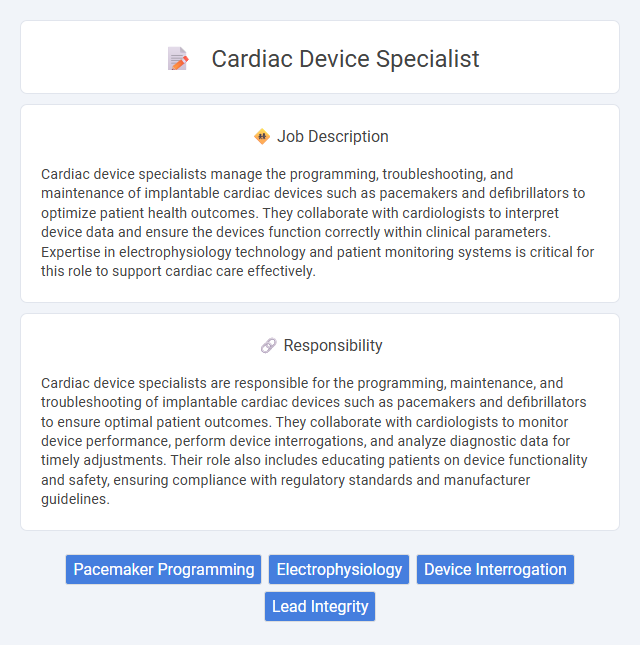
Cardiac device specialists manage the programming, troubleshooting, and maintenance of implantable cardiac devices such as pacemakers and defibrillators to optimize patient health outcomes. They collaborate with cardiologists to interpret device data and ensure the devices function correctly within clinical parameters. Expertise in electrophysiology technology and patient monitoring systems is critical for this role to support cardiac care effectively.
Individuals with a strong interest in cardiac health and technology are likely to find a cardiac device specialist role suitable, especially if they possess detail-oriented skills and the ability to work well under pressure. Those comfortable with patient interaction and continuous learning about medical devices may thrive in this field. Candidates with a background in healthcare or biomedical engineering could have a higher probability of success in managing and troubleshooting cardiac implantable devices.
Qualification
Cardiac device specialists typically require a background in biomedical engineering, cardiovascular technology, or nursing, complemented by certification from recognized bodies such as the International Board of Heart Rhythm Examiners (IBHRE). Proficiency in managing implantable cardiac devices including pacemakers, defibrillators, and cardiac resynchronization therapy devices is essential. Strong knowledge of electrophysiology, patient monitoring systems, and troubleshooting device malfunctions enhances their qualification profile.
Responsibility
Cardiac device specialists are responsible for the programming, maintenance, and troubleshooting of implantable cardiac devices such as pacemakers and defibrillators to ensure optimal patient outcomes. They collaborate with cardiologists to monitor device performance, perform device interrogations, and analyze diagnostic data for timely adjustments. Their role also includes educating patients on device functionality and safety, ensuring compliance with regulatory standards and manufacturer guidelines.
Benefit
Cardiac device specialists likely offer significant benefits by ensuring optimal functioning of pacemakers and implantable cardioverter-defibrillators, potentially improving patient outcomes and quality of life. Their expertise in device programming and troubleshooting may reduce the risk of device-related complications and hospital readmissions. Employers might find value in hiring these specialists due to their role in enhancing patient care efficiency and supporting cardiac care teams.
Challenge
A cardiac device specialist likely encounters complex challenges due to the precise nature of implanting and maintaining life-saving devices such as pacemakers and defibrillators. The role probably requires continuous adaptation to advanced medical technology and strict adherence to safety protocols, which may pose significant stress and demand high levels of technical expertise. Managing unexpected device malfunctions or patient complications could frequently test problem-solving skills and resilience.
Career Advancement
Cardiac device specialists manage and maintain pacemakers, defibrillators, and other implantable cardiac devices, playing a crucial role in patient care and device technology. Career advancement opportunities include transitioning to clinical management positions, becoming trainers or consultants for cardiac device companies, or pursuing further education to specialize in electrophysiology. Continuous skill development in emerging cardiac technologies and certification in cardiac device management can lead to higher-level roles and increased professional recognition.
Key Terms
Pacemaker Programming
Cardiac device specialists expertly program pacemakers to optimize patient cardiac function, ensuring device settings are tailored to individual cardiac rhythms and clinical needs. These professionals utilize advanced diagnostics and software tools to adjust pacing parameters, troubleshoot device malfunctions, and interpret electrophysiological data for precise intervention. Maintaining updated knowledge on the latest pacemaker technologies and regulatory standards is essential for enhancing patient outcomes and device longevity.
Electrophysiology
Cardiac device specialists in electrophysiology are responsible for the implantation, programming, and management of cardiac rhythm devices such as pacemakers, implantable cardioverter defibrillators (ICDs), and cardiac resynchronization therapy (CRT) devices. They work closely with electrophysiologists to monitor device function, interpret device data, and optimize patient treatment for arrhythmias and heart failure. Expertise in programming software, troubleshooting device issues, and understanding cardiac electrophysiological principles is essential for ensuring effective therapy and patient safety.
Device Interrogation
A Cardiac Device Specialist expertly performs device interrogation to assess pacemakers and implantable cardioverter-defibrillators (ICDs) functionality, reviewing diagnostic data and battery status to ensure optimal device performance. Proficient in using advanced programmer tools, the specialist identifies arrhythmias, detects device malfunctions, and makes necessary adjustments according to physician protocols. Mastery of device interrogation enhances patient management by providing accurate, real-time cardiac monitoring and enabling timely intervention.
Lead Integrity
Cardiac device specialists ensure the optimal performance and safety of implantable cardiac devices, with a critical focus on Lead Integrity to prevent complications such as lead fractures or insulation breaches. They utilize advanced diagnostic tools to monitor lead function and address potential malfunctions timely, improving patient outcomes and device longevity. Expertise in troubleshooting and maintaining lead systems is essential for reducing device-related risks and enhancing cardiac therapy effectiveness.
 kuljobs.com
kuljobs.com